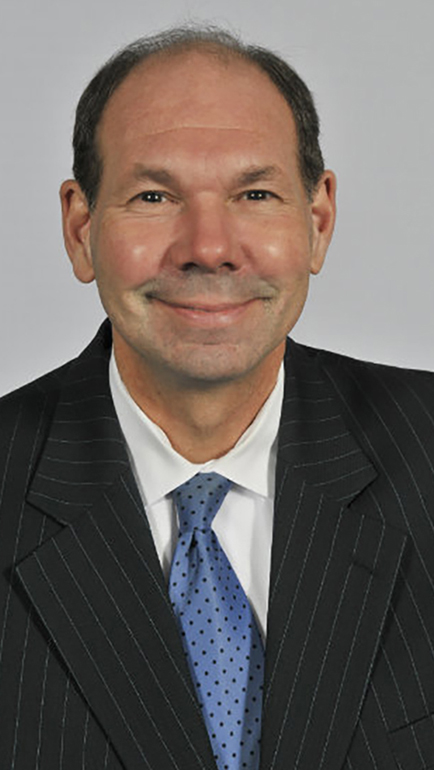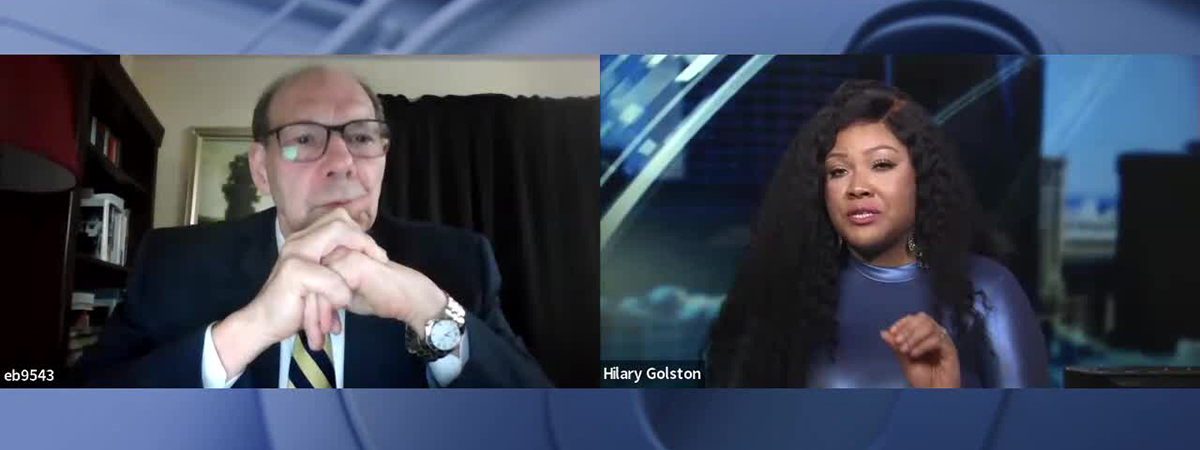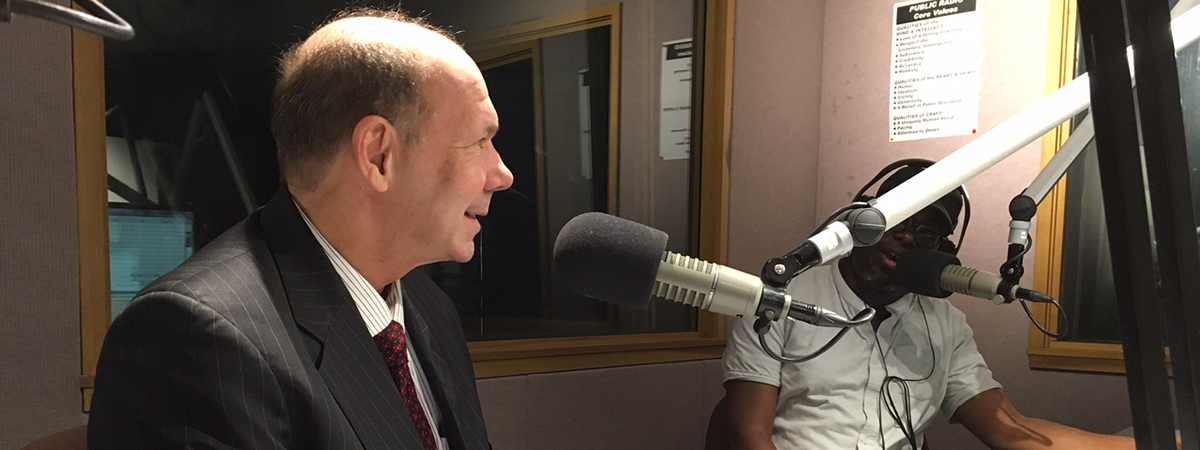DETROIT – In the heart of the world’s automotive capital, Wayne State University is not only home to the largest labor archives in North America and one of the top labor studies programs in the U.S., it’s also home to one of the most recognizable faces associated with the recently settled strike against Detroit’s Big Three.
For more than two months, Marick Masters, Ph.D., a labor expert and professor of management at the Mike Ilitch School of Business, shared the media spotlight with key figures from Ford Motor Company, General Motors, Stellantis NV, and the United Auto Workers (UAW).

Masters has been an invaluable resource for journalists across the country, who’ve provided daily updates on the strike that began Sept. 15, when more than 12,000 UAW members walked off the job at one assembly plant at each company.
“He’s very responsive and it’s important to know that I can call him anytime,” said Jamie L. LaReau, an automotive reporter at the Detroit Free Press. “He has access to a lot of data points that he can quickly point me to and share with me and provide insight into what it means. His expertise into putting things into context is incredibly important because it’s one thing to report the facts but it’s another thing to report what it means. And that’s where you need experts to weigh in.”
Since August, Masters has granted more than 300 interviews to reporters and TV anchors. He’s appeared on national TV, including the CBS Evening News with Norah O’Donnell, and been quoted in every major newspaper across the country, including The New York Times, Washington Post, Chicago Tribune, Los Angeles Times, and USA Today. Masters even penned opinion columns for the Free Press and The Conversation.
Masters has appeared 20 times on four WJR 760 talk shows, including seven guest appearances on Focus with Paul W. Smith. Smith is a longtime radio host who has made a career out of interviewing Michigan’s most influential newsmakers. He considers Masters a valuable asset when discussing labor issues related to the automakers.
“Professor Masters proved to be an excellent contributor during the UAW strike, offering insightful analysis and valuable perspectives,” Smith said. “His extensive experience in teaching and research spanning over three decades has earned him a reputation as a leading authority in his field. For anyone seeking authoritative and informative commentary on labor studies, Professor Masters is a go-to resource.”
LaReau agreed, adding, “His access to facts and statistics, not to mention the historical context that he is familiar with, makes him a great source. He can direct a reporter to all of those things; that’s invaluable, especially when you are on deadline.”
Ilitch School Dean Virginia Kleist, Ph.D., believes Masters’ greatest value is in how he uses his expertise to convey what he knows in layman’s terms for everyone to understand what is really going on.
“It doesn't surprise me that he is fielding hundreds of media questions during this strike because he not only has an excellent grasp of the larger picture,” Kleist said, “but he conveys what he sees in a way that the rest of us can follow along so that we better understand what is going on behind the scenes.”
Masters’ media hits have been so analytically insightful, it’s as if he had a seat at the negotiating table.
“I assume he does have sources,” said LaReau, who has called upon Masters’ expertise since the GM strike in 2019. “He’s definitely somebody who has a rich background in labor negotiations.”
When asked if he has sources on both sides, Masters said, “I know people who I could pick up the phone and call. But I would never call somebody for tidbits of information that I can just share to get a media spot or to get some media interest. I don’t do that.”
Dean Kleist said one of the most interesting aspects of Masters is that he models his leadership style on some of the academic principles of good leadership.
“He is forthright, doesn't take credit for others’ work, and is a gentle and pleasant person to work with at all times,” she said. “He never becomes ruffled or is challenging to work with, but remains centered, upbeat and positive.”
As details of tentative agreements are released and ratification votes take place, reporters continue to seek Masters’ opinion and knowledge. However, he’s not the only Wayne State faculty member or staffer to appear in strike coverage. His Ilitch School colleagues – professors Catherine Cuckovich; Kevin Ketels; Prabhjot Mukandwal, Ph.D.; and Jeff Rightmer, Ph.D. – have all opined about aspects of the strike that lasted six weeks. Gavin Strassel, UAW archivist at Wayne State’s Walter P. Reuther Library – home of the largest labor archives in North America – also provided historic perspective to the media.
While negotiating rhetoric – on both sides – reached the boiling point at times, Masters was a level, unbiased voice, saying, “I don't have a dog to hunt or an ax to grind. I try to be objective, although I do state my priorities pretty clearly.”
Masters believes in unions and collective bargaining, but views negotiations from both sides and has always tried to strike a balance and wisdom of looking at both parties’ specific positions and tactics.
“I try and give perspective that reporters might not get through a casual conversation to offer some insight as to where I think things are going,” he said. “This is where my background as an academic has helped, because it helps me analyze the situation and look at things in a broader context. That's what I try to do to put things in perspective for them.”
FOLLOWING A FATHER’S LEAD

From a young age, Masters, the son of a former college professor and Capitol Hill aide, had ambitions of following in his father’s unique career paths.
“One of the reasons I became a professor is my dad, and I saw how much he was able to do in addition to that role as a professor,” said Masters, who was born in Madison, Wisconsin, where his father, Nicholas Masters, Ph.D., finished his doctorate at the University of Wisconsin.
From 1955 to 1974, the elder Masters taught political science at Wayne State, Penn State University, Southern Illinois University and Washington University in St. Louis. And he later became an aide to Senator Philip Hart (D-Mich) and served as majority staff director and special assistant to the chairman of the House Budget Committee.
There was a period when Marick Masters toiled with a career change as he explored politics, becoming a Democratic candidate for U.S. Congress in 1992. However, he lost in the primary of Pennsylvania’s 18th District, in which freshman Rep. Rick Santorum (R-Penn) eventually won reelection.
“I gave a lot of thought to running again, but the circumstances just weren’t right,” Masters said. “You really have to have a fire in your belly if you want to run for Congress and that fire sort of waned.”
Masters’ decision to remain in academia allowed him to create a niche as an author, commentator and consultant. He has served on editorial and non-profit boards, and is a senior partner with AIM Consulting Associates, based in New London, Connecticut. He also conducted a major study on federal-sector labor-management partnerships for President Bill Clinton’s National Partnership Council.
“More than almost any other profession that I know, professors have more freedom over their time, and you can use it well, or you can use it unwisely,” he said. “I hope I've used most of it relatively well. But one thing I can say is that you are able to speak on issues that you can't if you're in a corporate setting.”
Currently, Masters, who has already published four books, is working on three more projects, which focus on President Richard Nixon’s political comeback in the 1960s, the controversy and state of the nation during the 2020 election, and the 2023 UAW labor negotiations. Also, Masters and fellow Ilitch School professor Bill Volz, Ph.D., J.D., plan to launch a co-hosted podcast, The Business of Politics, which is scheduled to premier later this fall.
“I’m almost done with the Nixon book,” he said. “I'm working on the UAW book on a daily basis. But that almost writes itself given the developments of the strike.”
In May, Masters says he plans to join his wife, Sally, in retirement. The couple, who met as students at Southern Illinois, married in 1977 and raised five children, now have seven grandchildren.
“I don't think I can retire and sit at home,” Masters said, laughing. “I know that that would not be well received by any of my family.”
IRON CITY TO MOTOR CITY

Dean Kleist was a doctoral student at Pittsburgh when she first met Masters. Then, he was a professor of business administration and the director of the Center on Conflict Resolution and Negotiation.
“I was in awe of him then, and am now, too,” said Kleist, who briefly worked with Masters at Pitt. “I remembered thinking that he was going to be a force of nature as an academic. It turns out that my very junior Ph.D. student observations of him were indeed true because Dr. Masters is indeed one of the finest professors in his area of labor relations management in the nation.”
Kleist said Masters has been a huge asset to both Wayne State and Detroit’s business community.
“He is a stand-up person of deep integrity,” she said. “He has been very contributory in terms of his research, teaching and service while at the Mike Ilitch School of Business. It was only fitting that he came to Wayne State University, located in the heartland of the American industrial region, to conduct his research, contribute and deepen his extensive knowledge on labor-management relations. We have been very fortunate to have such a serious labor-management researcher here at Wayne State, lending his expertise not only in the classroom but also with his communications in the business community.”
Masters was comfortable in Pittsburgh. But in 2008, he was approached by Wayne State leadership to the director of Labor@Wayne, which includes the Douglas A. Fraser Center for Workplace Issues.
“I had been at Pittsburgh for 22 years, and my kids were getting old enough to where I thought I could move if the circumstances were right,” he said. “The Doug Fraser Center is what I really wanted to do. Those things don't necessarily come around too often. So, I thought I was at that stage in my career when I was young enough, then I could give it a good go for a number of years and still have some time afterwards to top off a career.”
Now, he plans to enjoy retirement and pursue other interests, but said he’ll miss the classroom and teaching Business Negotiations and Human Resource Management.
“I started teaching online during the COVID period and got used to that,” Masters said. “I do miss the classroom. I looked forward to that teaching. That's one of the things I've always enjoyed in my 40-year academic career is being in the classroom.”
The way LaReau sees it, Masters has been an exemplary ambassador for Wayne State.
“It’s definitely important for any university to have its name in national publications like that,” she said. “It shows that he is a rich resource and has an expertise and a knowledge that people rely on and tap in to. I think it’s especially important since Wayne State is in Detroit and these are the Detroit automakers and this is the Motor City. So, it’s all kind of connected.”
Upon hearing of Masters’ impending retirement plans, LeReau said, “Hopefully, there will be somebody who follows him at Wayne State who has some kind of knowledge in labor that we can tap into. But if he is still active doing something with labor, of course, we would still want to talk to him.”
